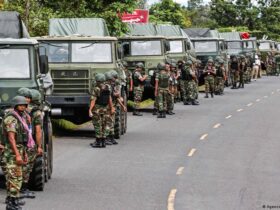Peace talks between Afghanistan and Pakistan ended in a deadlock on Friday, with Afghanistan’s Taliban government blaming Islamabad’s “irresponsible and uncooperative” approach for the standoff.
Representatives of the two neighboring countries met in Turkey on Thursday to secure a ceasefire they had agreed to after border clashes on October 19 left casualties on both sides.
Taliban spokesperson Zabiullah Mujahid blamed Pakistan for this.
“During the discussions, the Pakistani side attempted to put all responsibility for its security on the Afghan government, while showing no willingness to take responsibility for Afghanistan’s or its own security,” Mujahid said.
But despite the talks failing, the spokesman said the ceasefire “will remain in place.”
Mujahid said there was “no problem” with the ceasefire and thanked Qatar and Turkey for their mediation roles.
What did Pakistan say on the talks?
In an interview with Pakistan’s independent Geo News channel, Pakistani Defense Minister Khawaja Asif said, ‘As we speak, the talks are over.’
However, he also said that the ceasefire will continue until the Afghan side violates it.
Neither country has shared details of the talks in Türkiye.
On Thursday, Pakistan’s Information Minister Ataullah Tarar hinted that the talks were failing, saying Afghanistan had “so far failed” to fulfill its promise to curb terrorism.
“Pakistan will continue to exercise all necessary options to protect its people and protect its sovereignty,” he said.
What is behind Pakistan-Afghanistan tension?
Fierce fighting broke out between the Pakistani military and Afghan Taliban forces last month, the deadliest conflict between the neighbors since the Taliban returned to power in Kabul in 2021.
Tensions between the once-allies escalated after Islamabad demanded that Kabul take action against Tehreek-e-Taliban Pakistan (TTP), a splinter group closely linked to the Afghan Taliban.
The TTP seeks to impose a radical interpretation of Islam, particularly on Pakistan’s northwestern Khyber Pakhtunkhwa province, which borders Afghanistan.
According to the Pakistani government, the group operates without fear from Afghan soil, a charge the Afghan Taliban denies.
TTP militants have intensified attacks against Pakistani security forces in recent years.
A UN report this year, referring to the Taliban government in Kabul, found that the TTP “receives substantial logistical and operational support from the de facto authorities”.
The neighboring nations also share close historical, cultural and people-to-people ties.
Millions of Afghans who fled the war-torn country in the last 40 years have found shelter in Pakistan.
But in the wake of the clashes, Pakistan has intensified the crackdown on Afghan migrants in the country.
Edited by: Carl Sexton






Leave a Reply